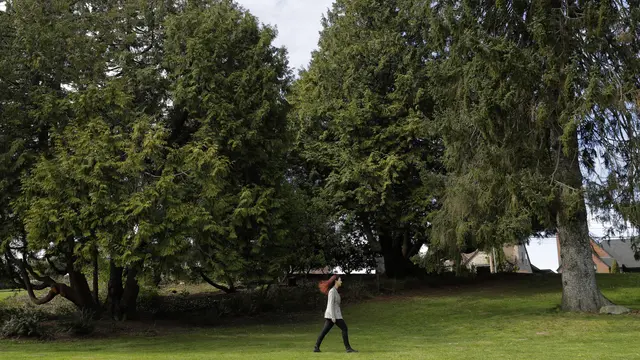
Editor's note: Ravish Bhatia was a Yenching Scholar at Peking University and hosts the Use Case podcast. The article reflects the author's opinions and not necessarily the views of CGTN.
Fifty years ago, on a March high noon in the campus of the University of Michigan, around a thousand students stood witness to a mock trial – not against any man or a woman, but a humble 1959 Ford sedan. The acquisition was that the automobile industry was responsible for the massive environmental pollution in the U.S.
"But what would actually happen to [Americans] if you took away cars?" the prosecutor remarked, according to an account of the incident in the Smithsonian magazine, before vindicating it completely. What was supposed to be a mock trial ended up being a guerrilla theater with angry students and activists punishing the car by smashing it with hammers. This was the same year that Earth Day was celebrated for the first time.
Back then, it was the major technology of the day i.e., the automobile, that was considered responsible for the damages caused to the environment. Ironically enough, it is the major technology of today – internet and mobile devices that is being regarded as the solution to the crisis today.
Most likely by the time you're reading this piece, thousands across the world are sharing virtual posters on social media with hashtags like #EarthDayNetwork (you should too!), attending presentations, and hopefully, somewhere there is an online mock trial happening against the many culprits of global warming. None of this would have been possible without the current age digital technologies that power our world.
As a rational techno-optimist, I believe that technology has generally evolved to create a net positive effect on us as a civilization, and going forward, this would continue to be the case. The positives of technology, especially the internet economy, far outweigh the negatives.

An electric car (BMW I3) is charged at a charging station. March 26, 2020, Bavaria, Germany. /AP
But at the same time, I am also cognizant of the costs to the environment that are incurred in creating these digital technologies. Producing semiconductors that power our phones and laptops requires the aggressive mining of minerals. Even the renewable sources of energy that could be used to power our devices, don't entirely have a zero cost to the earth. Generating hydropower often leads to flooding of entire ecosystems and the cells that power solar farms are non-biodegradable and chemically hazardous.
So what should we do to ensure digital technologies lead the way for a greener tomorrow?
First, we must build, and build efficiently. We can't replace fuel-guzzling cars without first building efficient energy vehicles. The approach to the climate problem must be to focus all our energy and resources in constantly innovating and building better products, rather than outright banning technologies that harm. That approach has not worked in the past, and is very unlikely to work in the future.
Investors must attribute higher multiples to ESG principles to ensure a greater flow of capital to efficient low energy-consuming technologies. Instead of spending ridiculous sums of money lobbying governments to slow down the pace of adopting green technologies, industry groups should focus on investing in energy-efficient ventures.
Second, we must do it together. Even though digital technologies have connected us across the globe, we remain divided on our approach to combating the climate crisis. Apart from being Earth Day today, it is also the anniversary of the signing of the Paris Agreement, a historic charter for tackling climate change which was agreed to by most countries on April 22, 2016, but unfortunately abandoned by some.
When the pace of technological advancement is spread across the globe, the problem of climate change impacts everyone across the world and the digital age makes the earth a global village – then why should our responses be uncoordinated, in silos and sometimes downright inadequate? The lack of a uniform coordinated response to the coronavirus crisis has shown the cracks in our ability to solve global problems together as a human race. Instead of waiting for the brewing climate crisis to test us as a society the way COVID-19 has, nations must forego their differences and work together to combat this crisis. That requires a huge deal of political will.
This Earth Day, the thousands of people logged in at the same time across the world will speak out louder than ever on issues that impact our world. We should ensure that these voices be heard and participate in them to the best of our abilities.
(If you want to contribute and have specific expertise, please contact us at [email protected].)
 简体中文
简体中文





